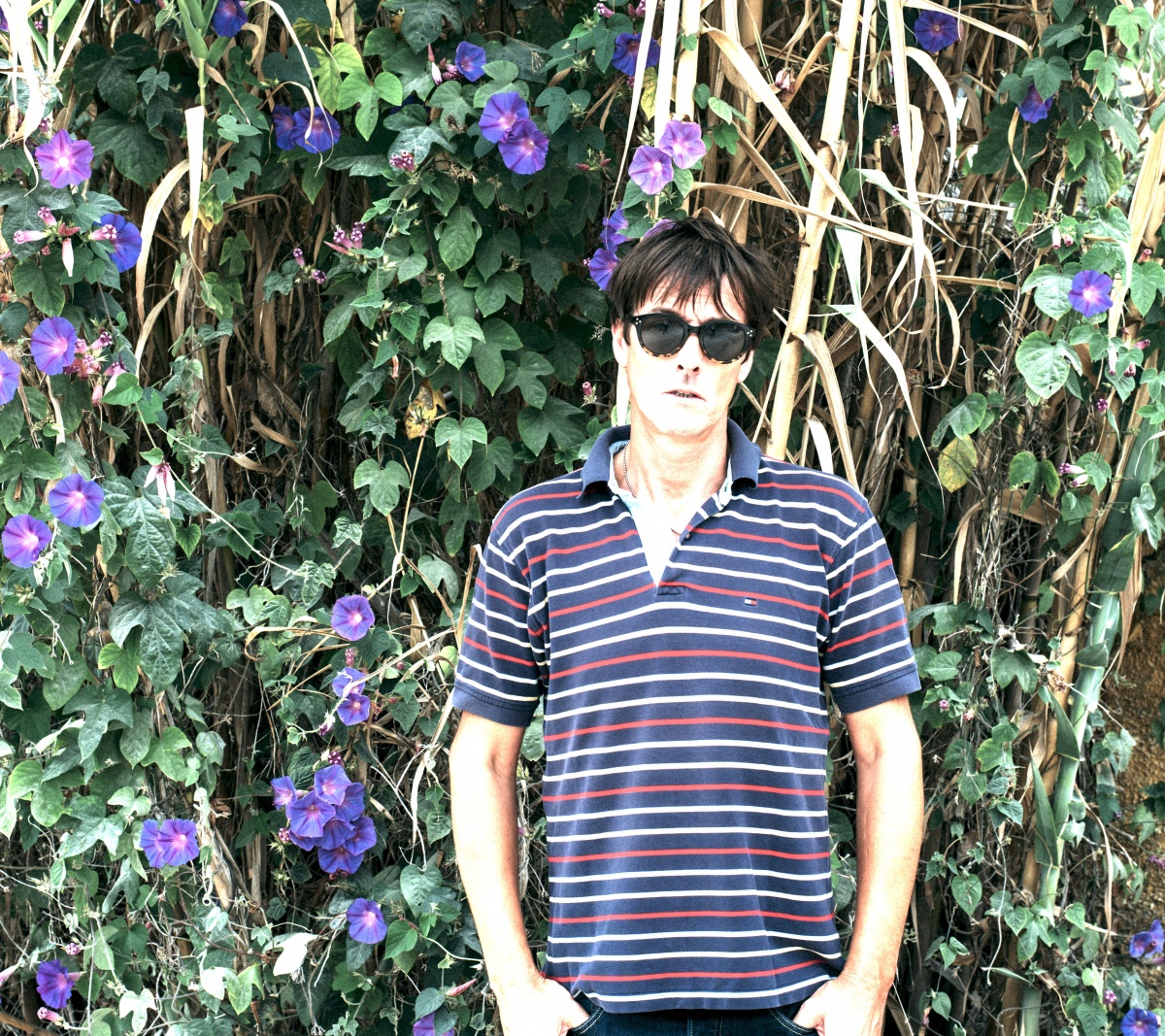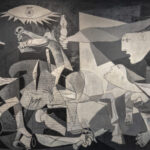Interview: Sonic Boom
Posted: by The Alt Editing Staff

Peter Kember is calling from his home in the mountains of Sintra, Portugal; a town about a half hour’s drive from the country’s capital, Lisbon, that was, for many centuries, the premiere vacation spot for Portuguese kings. Tourists still flock to witness the remaining palaces, but today, Sintra is occupied by royalty of a different bloodline: experimental psych-pop artists. Kember fell in love with the region a decade back when he was working on a project with Animal Collective’s Noah Benjamin Lennox (aka Panda Bear), and then he and his wife decided to make the move themselves.
“Portugal has a stunning wealth of vibey spots,” he says. “I couldn’t believe that I could afford to live somewhere so rich in natural beauty.”
The 54-year-old English musician has a deep, slightly gravelly voice and a perky, cheerful affect. So even when he casually says things like, “The rain brings an incredible verdant richness to the whole area,” he genuinely sounds like a Planet Earth narrator. As it turns out, his new solo record All Things Being Equal would pair quite well with a documentary about nature and the almost-psychedelic symbiosis of ecosystems. That’s one of the main subjects he tackles on the album, but it’s also a record that approaches personal reflection and mortality with an intense form of existentialism.
It seems fitting that Kember decided it was time to be contemplative. All Things Being Equal is the first album he’s released under the Sonic Boom moniker since 1990, back when he was mostly known as the co-creator of his teenage band Spacemen 3. He and his bandmate Jason Pierce (who went on to form Spiritualized) mixed the dead-eyed thud of Jesus and the Mary Chain with the acid-soaked bleariness of the 13th Floor Elevators, creating a sound that predated genres they’d fall into today like shoegaze and slowcore. He thinks of his time in that band as the building blocks for a whole career as the unfazed outsider.
“[Spacemen 3] kind of did what we did in isolation and we weren’t doing it for any other reason other than that’s what we really wanted to do,” Kember says. “And we had to feel like that about it because there was almost no interest in the music locally. Most of our friends thought we were the dumbest thing they’ve ever heard. Some thought it was worse than that, actually. Some thought it was downright insulting.”
After that first Sonic Boom record, Spectrum, Kember got caught up in other projects and the decades flew by. In the 1990s he formed a whole band called Spectrum and an experimental synth project called E.A.R. (which involved collaboration with My Bloody Valentine’s Kevin Shields), and he collaborated with many other people’s projects over the years. Throughout the 2000’s and into the 2010’s he became a well-regarded producer, and within the last ten years he’s worked on landmark records like MGMT’s kooky sophomore curveball Congratulations, Panda Bear’s Tomboy, and Beach House’s excellent 2018 record, 7.
Kember is an open book who’s down to talk about any of that in detail, but he’s just as likely to veer into thoughtful tangents about our collapsing environment, how consumerism is driving us toward extinction, and the many positive qualities of animist theory. Those are the sort of things that are on his mind—particularly since moving to Portugal—and All Things Being Equal is his attempt to have an actual material impact on the world through music.
He was inspired by Newton’s third law (every action has an equal and opposite reaction) and he wanted to get those sentiments across both lyrically and musically. On songs like “Just Imagine”, “The Way That You Live”, and “Things Like This (A Little Bit Deeper)” he sings about being conscious of the interconnectedness of humanity and nature, and uses high-pass filters to give the fizzy modular synthesizers on every song a lively, electric quality. Then there are songs like “Spinning Coins and Wishing on Clovers” and “My Echo, My Shadow and Me” that take a turn into much darker, even nightmarish psychedelic territory as Kember looks back on his life and considers what he is and isn’t proud of.
Kember spoke in-depth about the album’s existential lyrics, translating patterns in nature into music, and what it was like to revisit Sonic Boom after all these years. Our conversation has been condensed for clarity.
Why was now the time you decided to make a Sonic Boom album after all these years? Was it something in the air?
I never wanted to make a lot of records. I never tried to make a lot of records, and I felt like if I was going to make another record with the way I feel about the music industry, which in general has some work to do on itself still, I wanted to make something that hopefully could be useful to people. I feel like we’re at a fairly critical stage on this planet where we’re kind of a do-or-die time and I think if we don’t do it, we will die. It will be the end of our race or we’ll see massive swaiths cut out of humanity by what we’re doing to the planet.
I didn’t want to make a record just to make a living. Quite frankly I’d rather go out and cut down trees or something, or mow grass, or I’d rather have some useful interaction with nature than making my living by making music for the sake of it. I never felt I did, but I felt with this album I really wanted to use any powers that I had to try and be part of some solution more than part of the problem.
I think the sound of the record has this cyclical feeling to it that reflects that “equal and opposite reaction” law. This album feels like it’s own ecosystem of synths, so was capturing those themes in a musical sense something you were going for?
Sometimes some people recognize the patterns in things, which happen on many different levels. By applying what I see in the ways plants interact to synthesizers, to me, I’m recognizing patterns and modulations and echoes and saying, “If that’s so beautiful in a plant, it probably is in a sound as well.” I don’t want to make it sound like I have this fantastic, grand plan and everything comes out perfect. I scrabble around in a waking nightmare when I’m working. It’s quite intense for me to make this stuff and it’s quite frightening, I have to say.
The song “Things Like This (A Little Bit Deeper)” has that hook, “Take me somewhere a little bit sweeter/ gonna rest my soul and find some peace there.” What I find interesting about those lines is that they kind of fade out and warp at the song’s end, and then the track that follows is this deeply unsettling song, “Spinning Coins and Wishing On Clovers.” So you go from asking to be taken somewhere sweeter, and that leads to this disturbing voice-over for this very spooky, reflective passage of the record.
It’s diving deeper, it’s a psychedelic moment right there. I wanted to show a depth of stuff, [it might] mean different things to different people. For example, when I played the record for Panda Bear the first time, the first thing he came back and said was, “Who wrote ‘Spinning Coins and Wishing on Clovers’ and ‘My Echo, My Shadow and Me’?” And I said, ‘I wrote them.’ And he said, “Those are fucking something else, dude.”
It’s sort of serious stuff I was trying to deal with on the record and I wanted to show the breadth. I’ve always liked to do that on my records. And sometimes the songs that I do like that, they seem like something dark to unleash on the planet at some point, [but] people resonate with them really strongly. I had a song called “Angel” that I did which is about a friend of mine dying from a drug overdose, and there’s something really powerful and resonant about that somehow.
A lot of this record is talking about existentialism on a planetary scale, but “Spinning Coins and Wishing on Clovers” seems to be a more personal form of existentialism.
It’s talking about my life. The crux of it is: what are the visions that I’d see during that mythical moment when your life flashes before your eyes as you’re dying? I wanted to know what those visions would be. I’m not proud of everything I’ve done in my life, but I am proud of other things. And I guess it was the thought about trying to outweigh the things—which I expect to see in those flashes, I expect to see good and bad. But I wanted to try and weigh it up and outweigh any mistakes I made, by design or by ignorance. I wanted to be able to consider those things before.
But ultimately, I haven’t lived a perfect life, a lot of people would say, by using drugs for example, I’ve lived a very unholy, bad life. My sort of punchline is that I’d still do it. I’d still spin those coins and wish on clovers. Chance and luck will always play a part of my life, and sometimes it’s chance and random happenings in life that are some of the most magnificent parts of it. The things that you never planned that happened to be magical, just by going out with a nice mindset and treating your fellow human beings with certain humility.
Do you think that’s part of the impetus of you making a solo album after so many years? You were kind of thinking about your life in this reflective manner?
Yeah, I guess so. I think a lot of this stuff was floating around and I think I just decided that I needed to get things a little more focused. . .There was a song by the Beach Boys called “A Day In the Life of a Tree” which was a song sung from the perspective of being a tree, and I always thought that it was a really beautiful, deep song. Really, really pretty song. And it didn’t have a hippy, tree-huggy thing about it; it was just really connected. I remember first hearing it 30 years or so ago now and it always stood with me and I was like, “I’d really like to make an album that has that same connectedness and communication with nature, but also with humanity.” I do think we’re equal, that all things are equal, and I’d like to see all things treated as being equal.
I was revisiting a Beach House interview from a couple years ago and they were talking about how you encouraged them to just try anything and follow their instincts. And to just use weird sounds, regardless of how they’ll sound live. It sounds like you really fostered a sense of freedom in the studio for them. When you’re working alone, are you still able to lean into that “try-anything” approach?
I saw this thing David Bowie said a few years before he died where someone asked him how he knew when something great was happening in the studio. And how he knew when he was doing something that was really going to be next-level for him. He said [paraphrased], “Whenever it feels like I’m drowning slightly and my feet can’t touch the bottom, and I feel uncomfortable and slightly panicked, I know something good is happening.” I saw that and I was like, “Oh, that’s really nice, that’s really gonna help me.”
Because I go through that same sort of feeling. But from past experience, whenever I felt that, the tracks that came out of it were really good–in that they connected with people strongly. And sometimes when it feels really hard to emotionally vent, I suppose, to display your emotions—in some ways it’s not the easiest thing. Getting up effectively on a stage and displaying your emotions is something I never found particularly easy. But when I did it I found people resonated with it, so I take some reassurance in the fact that David Bowie was shitting his pants in the studio as well.
—
Eli Enis | @eli_enis
The Alternative is ad-free and 100% supported by our readers. If you’d like to help us produce more content and promote more great new music, please consider donating to our Patreon page, which also allows you










